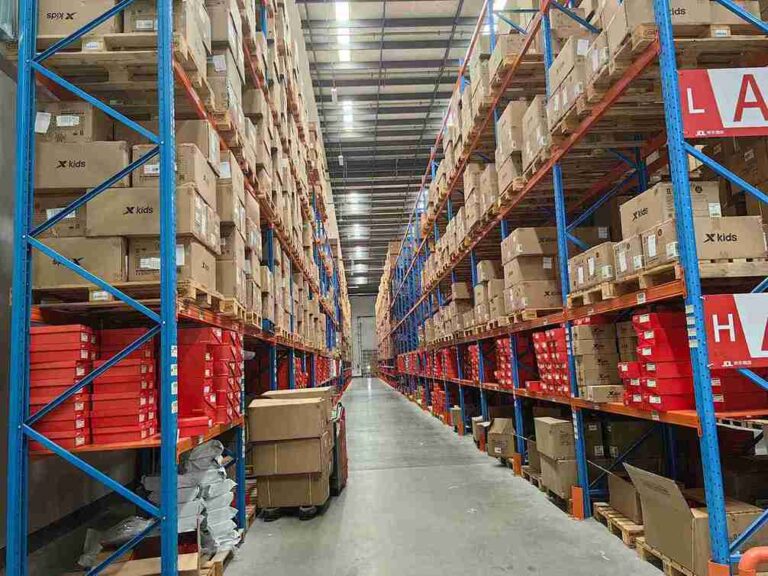📐 "First 50 Enterprise Queries Get Custom 3D Warehouse Design" Plan

Introduction: Why Every Warehouse Needs Anti-Collapse Mesh for Racking
In industrial storage environments, anti-collapse mesh for racking isn’t just an optional safety feature—it’s a critical investment that prevents catastrophic accidents. When improperly secured, storage racks can collapse under heavy loads, leading to worker injuries, inventory damage, and costly OSHA violations.
This definitive guide explores how anti-collapse mesh for racking creates safer warehouses while improving operational efficiency. Facility managers, safety officers, and warehouse operators will discover:
- The hidden risks of unsecured racking systems
- How anti-collapse mesh for racking physically prevents disasters
- Compliance benefits with OSHA, RMI, and EN standards
- Real-world case studies showing accident prevention
- Expert installation and maintenance best practices
By implementing anti-collapse mesh for racking, businesses transform their storage areas into safer, more compliant, and more productive spaces.

The Alarming Reality of Racking Collapses in Warehouses
How Storage Racks Fail Without Anti-Collapse Mesh
Industrial racking systems face multiple failure points that anti-collapse mesh for racking specifically addresses:
- Forklift Impacts – A single collision can weaken uprights, causing progressive collapse
- Overloaded Beams – Exceeding weight limits distorts rack geometry
- Improperly Secured Loads – Shifting pallets create unbalanced forces
- Corrosion & Fatigue – Weakened components fail suddenly under stress
In each scenario, anti-collapse mesh for racking acts as a containment system, preventing falling objects from triggering chain-reaction failures.
The True Cost of Racking Collapses
Recent industry data reveals shocking consequences when facilities lack anti-collapse mesh for racking:
- $250,000+ average cost per racking-related OSHA violation
- 47% of warehouse injuries involve falling objects
- 3-6 weeks typical downtime after major collapse incidents
- 12% increase in insurance premiums post-accident
These statistics prove why leading warehouses now consider anti-collapse mesh for racking mandatory rather than optional.
Anti-Collapse Mesh for Racking: Engineering Safety Into Storage Systems
How the Mesh Physically Prevents Disasters
Unlike simple netting, professional-grade anti-collapse mesh for racking incorporates:
- High-tensile steel cables (typically 5-8mm diameter)
- Woven grid patterns (50mm x 50mm to 100mm x 100mm)
- Galvanized or powder-coated finishes for corrosion resistance
- Load-rated attachment points securing to rack uprights
This engineered approach allows the mesh to:
✔ Contain up to 400kg of falling debris
✔ Absorb forklift impact energy
✔ Maintain integrity during seismic events
✔ Withstand prolonged UV exposure
Material Comparison: Choosing the Right Mesh
| Material Type | Best For | Load Capacity | Lifespan |
|---|---|---|---|
| Galvanized Steel Mesh | Heavy industrial use | 400kg/m² | 10-15 years |
| Stainless Steel Mesh | Food/pharma facilities | 350kg/m² | 15-20 years |
| Polymer-Coated Mesh | Corrosive environments | 250kg/m² | 7-10 years |
Facility managers should consult with anti-collapse mesh for racking specialists to select the optimal material for their specific conditions.
5 Undeniable Business Benefits of Anti-Collapse Mesh for Racking
1. Dramatic Reduction in Workplace Injuries
Warehouses using anti-collapse mesh for racking report:
- 72% fewer object-strike incidents
- 68% reduction in lost workdays
- 55% lower workers’ compensation claims
2. Complete OSHA & RMI Compliance
Properly installed anti-collapse mesh for racking satisfies:
- OSHA 1910.176(b) (load securement)
- RMI MH16.1 design specifications
- EN 15635 European standards
3. Protection of High-Value Inventory
Case Study: An automotive parts distributor prevented $280,000 in damaged inventory when their anti-collapse mesh for racking contained a pallet of brake components during a minor earthquake.
4. Insurance Premium Reductions
Many insurers offer 5-15% discounts for facilities implementing certified anti-collapse mesh for racking systems.
5. Improved Operational Confidence
Workers report feeling 89% safer when working near racks equipped with anti-collapse mesh for racking, leading to better productivity.
Implementing Anti-Collapse Mesh for Racking: A Step-by-Step Guide
Phase 1: Professional Rack Assessment
Certified inspectors evaluate:
- Current rack configuration
- Existing damage points
- Weight distribution patterns
- High-risk collision zones
Phase 2: Custom Mesh Specification
Experts determine:
- Required mesh density
- Optimal attachment methods
- Special considerations (e.g., cold storage)
- Future expansion needs
Phase 3: Precision Installation
Certified technicians:
- Install load-rated mounting brackets
- Tension mesh to proper specifications
- Conduct pull-test verification
- Label completed sections
Phase 4: Ongoing Maintenance
Recommended protocol:
- Quarterly visual inspections
- Annual load testing
- Immediate repair of any:
- Loose connections
- Visible corrosion
- Mesh deformation
Answering Top Industry Questions About Anti-Collapse Mesh for Racking
Q1: Can mesh be installed on existing racks?
Yes—professional installers retrofit anti-collapse mesh for racking on 95% of existing systems without structural modifications.
Q2: How does mesh affect pallet accessibility?
Properly installed anti-collapse mesh for racking maintains full forklift access while providing protection.
Q3: What’s the ROI timeframe for this investment?
Most facilities recoup costs within 18-24 months through:
- Reduced damage claims
- Lower insurance costs
- Fewer work stoppages
Q4: Are there fire safety considerations?
Galvanized steel anti-collapse mesh for racking meets most fire codes, while polymer versions may require additional sprinkler coverage.
Q5: How often should mesh be replaced?
With proper maintenance, quality anti-collapse mesh for racking lasts 10+ years before requiring replacement.
Conclusion: Transforming Warehouse Safety Through Anti-Collapse Mesh for Racking
Forward-thinking operations managers now recognize anti-collapse mesh for racking as essential infrastructure—not optional safety equipment. The combination of worker protection, inventory security, and regulatory compliance creates compelling business value.
Facilities implementing professional-grade anti-collapse mesh for racking systems typically experience:
✓ 60-80% reduction in rack-related incidents
✓ 25% faster OSHA compliance audits
✓ Improved employee retention and morale
✓ Enhanced reputation with safety-conscious clients
For warehouses ready to eliminate racking collapse risks, the solution is clear: partner with experienced anti-collapse mesh for racking specialists to design and install a customized protection system. The small upfront investment prevents exponentially larger costs from potential accidents.
Next Steps for Warehouse Managers:
- Schedule a no-cost rack safety assessment
- Request customized mesh system proposals
- Compare ROI projections for your facility
- Implement before the next OSHA inspection cycle




